I purchased DNA kits from Ancestry.com and 23andMe in 2017. I’ve been a regular user of both company’s services since then.
Both have added new DNA features, while aspects such as ethnicity estimates have greatly improved.
But if you can only purchase one DNA kit, which should you go for?
DNA Testing With 23andMe Versus Ancestry – Which Is Best?
This review is a head-to-head comparison of what you get from Ancestry versus 23andMe based on these categories:
- Health reports
- Ethnicity reports
- Researching your family history through DNA relatives
- Genealogy and building your family tree
- Resolving unknown parentage and finding birth family
I’ll give you the winner (and the reasons why) in each category.
You may only be interested in two or three of these categories. Just tot up which gets best marks with your areas of interest.
| Category | Winner | Quick Notes |
| Health reports | 23andMe | Ancestry doesn’t do health services |
| Ethnicity reports | Even | Accuracy depends on your heritage |
| DNA relatives | Ancestry | More relatives on Ancestry.com |
| Building your family tree | Ancestry | 23andMe doesn’t do genealogy services |
| Finding birth family | Ancestry | Get both if you can afford it |
Read on for detailed comparisons, examples, and screenshots.
23andMe Versus Ancestry: Price Comparison
Both companies run sales and special offers at different times throughout the year.
This table shows the standard pricing at the time of writing.
| Package | 23andMe | Ancestry |
| DNA test with relatives | N/A | $99 |
| DNA test with relatives + Traits | $99 | $119 (U.S. only) |
| DNA test with relatives + Traits + Health | $199 | N/A |
| Genealogy services | N/A | Pricing varies |
You can check out our detailed breakdown of 23andMe’s packages and costs.
Ancestry’s genealogy packages are also a little complex. We have a detailed breakdown of Ancestry membership and subscription costs.
What are traits?
Ancestry.com currently restricts their Traits add-on to the U.S, while they are part of 23andMe’s basic package.
Both companies provide genetics-based predictions of traits like:
- Ability to smell asparagus
- Likelihood of freckles
- Likelihood of a unibrow
- Lactose intolerance
I doubt that anyone pays a hundred bucks to learn if they can smell asparagus. However, many customers enjoy browsing these reports and predictions.
I looked through my 23andMe traits once after purchase, and I wouldn’t miss them if they disappeared. But I’ve continued to research my DNA relatives on both sites for years.

What about health?
The trait of “lactose intolerance” seems to be a more serious topic compared to some others on the list. It’s getting close to health territory.
Let’s move on and take a closer look.
Are You Primarily Interested In Health Reports?
Winner: 23andMe health package(s)
Companies must be very careful about national regulations on predicting health risks.
23andMe worked hard to achieve FDA compliance for a specific set of reports within their health packages. These include predictions for:
- Late on-set Alzheimers
- Parkinsons
- Type 2 diabetes
- Certain types of cancer
23andMe has made no secret that it sees health as its future.
In contrast, Ancestry.com discontinued its health features in 2021. This was never part of the standard purchase anyway.
Are you only interested in health information? Then the next steps are easy:
- Stop reading this article!
- Jump over to our breakdown of 23andMe’s different packages and costs.
Is health analysis just an interesting extra feature for you?
You may want to dabble in health aspects while pursuing your main goal of building a family tree.
In that case, Ancestry is still an option. Several reputable companies provide health reports based on your Ancestry DNA results.
Expect to pay an extra ten bucks for these services.
Make sure you only upload your DNA to legit websites!
Promethease is a long-established option. And if you want to know more about the background, you can check out our article on who owns Promethease.
Ethnicity Reports
Summary: no clear winner, both have advantages.
Both companies give you an estimated breakdown of your ethnic and geographic origins.
Here’s a quick summary of how I rate them:
| Measure | Winner |
| Accuracy at broad regional level | Same |
| European breakdown (Irish) | Ancestry |
| Non-European breakdown (African) | 23andMe |
| Neanderthal origins | 23andMe |
Always remember that these reports are estimates
Both companies have changed and improved their ethnicity calculations over the years. Personally, I’ve seen significant improvement in my broad region estimates on both sites.
However, changes can also lead to surprised and/or disgruntled customers.
In 2020, some Ancestry customers were startled to see a big jump in their Scottish percentage.
That same year, some 23andMe customers complained about an increase in their French and German percentages.
My point is that these reports are estimates that change over time.
But you’re probably most interested in how good they are right now! Let’s get into that.
What does 23andMe give you?
Here’s an excerpt of my ancestral composition report from 23andMe:
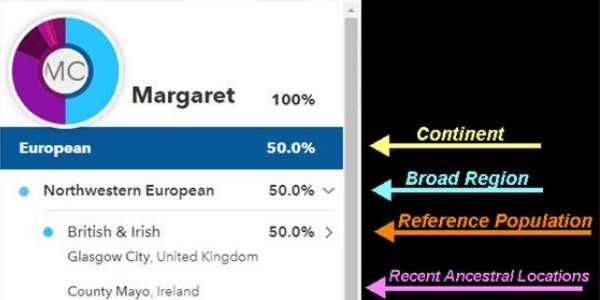
As you can see, the breakdown gets more specific as it works down through a geographical hierarchy.
I have a broad region of Northwestern European, with a narrower region of “British & Irish”. Other people may see “Italian” or “French & German” at the narrower level.
I have a full review that covers the accuracy of 23andMe’s ethnicity features.
I’ll summarize here by saying that the broad regional level is spot on for me.
However, things go awry as the estimate gets even more specific.
23andMe tells me that my recent ancestors were likely in Glasgow (Scotland) and Mayo (west of Ireland). That doesn’t match my family tree.
What does Ancestry give you?
Here is an excerpt from my ethnicity estimates on Ancestry.com.
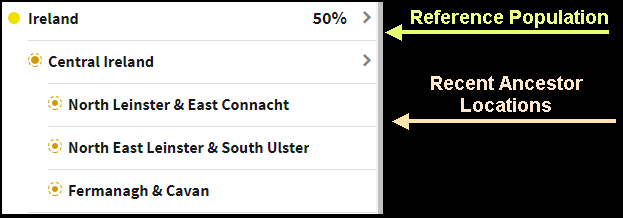
Ancestry doesn’t mess about with the broad continental labels. They jump straight to “Ireland” as my top level in the hierarchy.
This level used to read something like “Ireland & Scotland”. I can’t remember the exact label, but Ancestry.com couldn’t distinguish between the two neighboring areas. This was one of the improvements in 2020.
I have a full review that covers the accuracy of Ancestry’s ethnicity estimates.
I’ll summarize here by saying that the narrow regional level is spot on for me.
Ancestry is significantly better than 23andMe for my recent Irish heritage
The lowest level of my Ancestry.com estimates specifies three overlapping areas within the north-eastern quarter of a small country.
They’ve also got this spot on.
When Ancestry rolled out their most specific estimates in 2017/18, I was blown away by how accurate they are.
I’ll quickly mention that MyHeritage (another competitor) is also this accurate for my Irish side.
23andMe is slightly less poor for my non-European heritage
It’s fair to say that the ethnicity calculations from all the major DNA testing companies work best for European heritage.
Both companies have slightly improved my non-European breakdown over the past few years
Half my heritage is east African, and I judge 23andMe to be slightly better than Ancestry.com in its estimates.
I haven’t seen a clear winner in commentary from people with Asian or Indigenous American backgrounds.
Only 23andMe Does Neanderthal DNA
Unlike Ancestry.com, 23andMe gives you an estimate of your Neanderthal DNA. Here’s mine:
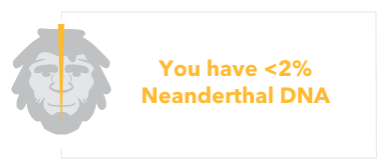
Ancestry doesn’t have a Neanderthal feature at all. So, let’s look a little further at what their rival offers.
23andMe can also tell you if you inherited Neanderthal “traits”. For example, they may predict that you are more likely to sneeze after eating dark chocolate.
What? Yeah, this isn’t exactly life-changing information. But it’s a bit of fun.
Researching Family History Through DNA Relatives
Winner: Ancestry
When your DNA kit is processed by Ancestry.com or 23andMe, you get access to a list of DNA relatives in their database.
You will see many genetic relatives who choose to provide details like their ancestral surnames and locations.
This combination of DNA matches with ancestral details is the key to why so many genealogy hobbyists use Ancestry and 23andMe to research their family tree.
You need both sides of this combo for successful genealogy research. But let’s start with how the companies measure up on the side of DNA relatives.
| Measure | Winner |
| DNA database size | Ancestry |
| No cap on the number of relatives | Ancestry |
| DNA tools for sophisticated research | 23andMe |
| Collaboration with relatives | Draw |
Who has the bigger DNA database?
Winner: Ancestry
I keep track of the size of the DNA databases amongst the major competitors.
Ancestry.com is the market leader with the largest DNA database of all. The company has 22+ million customers.
23andMe comes in a respectable second with 12+ million customers.
But that doesn’t really tell the full story. We need to look at the limits that both companies put on the number of relatives they will show you.
Who imposes the least number of limits on your DNA matches?
Winner: Ancestry
Both companies have a minimum threshold that limits how distant the cousin is to you. It’s a very low bar!
However, 23andMe cap your number of DNA relatives to 1,500 at the standard level of purchase.
You can upgrade to a higher level to get up to 5,000 DNA relatives.
These caps mean that most people will see far more DNA relatives on Ancestry.com. They have no cap on the total number that they will show you.
Personally, I have over 17,000 DNA relatives on Ancestry.com.
And I have fewer than most American customers. Some feel a little overwhelmed by over 80,000 distant cousins.
Who has the best DNA tools for research?
Winner: 23andMe
For reasons that customers like myself find difficult to understand, Ancestry.com gives the most limited set of DNA tools of the major DNA testing companies. The company added more tools in 2022, so the gap is closing.
The tools on 23andMe allow sophisticated research that increases your chances of identifying your connection with unknown relatives.
Both companies show you how much DNA you share with each relative on your list. They also give you a predicted relationship. This may be 3rd or 4th cousin.
But 23andMe has a suite of tools that let you delve down to the chromosome level to explore unknown relationships. This is a little complex to explain in this review (we have several tutorials on our website).
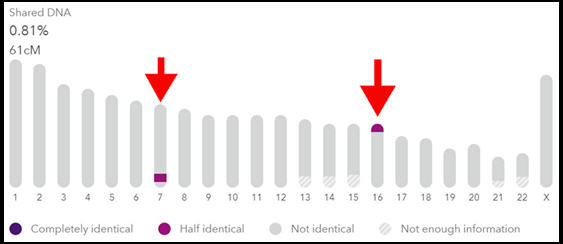
I’ll simply mention that I and many other Ancestry customers copy our DNA results to other reputable websites that have these powerful tools.
Unfortunately, the alternatives sites don’t have the kind of numbers of DNA matches as Ancestry!
Collaborating with DNA relatives
Summary: no clear winner, Ancestry has a slight edge
Both companies have a messaging system that lets you send requests to your DNA relatives for information and collaboration.
Unfortunately, the response rate to messages isn’t great.
It’s worth remembering that many people buy these products solely for ethnicity reports.
And with 23andMe, there will be a subset of customers that are only interested in the health reports.
But you should certainly reach out because a percentage of people will respond. They will be people like you, enjoying their hobby of genealogy and building their family tree.
I’ve had better success with messaging on Ancestry on 23andMe. Other people report similar.
But that’s because I tend to message Ancestry relatives who have a sizeable family tree on the website. This probably boosts the probability that this customer is into research and collaboration.
Which Is Better For Researching Your Family Tree?
Winner: Ancestry
Ancestry.com started out as a genealogy website. So, it’s no surprise that the family tree features and record archives make it a clear winner here.
I just wish that 23andMe would make a better effort in the area of genealogy.
Let’s have a quick rundown of what’s available on both platforms.
These features may not fully make sense before you actually get to use them. But I’ll try to explain them as clearly as possible.
| Feature | Ancestry | 23andMe |
| Family tree software | Y | N |
| Filter relatives by ancestral location and surname | Y | Y |
| Speculative “built for you” tree | Y | Y |
| Record archives | Y | N |
Online family tree software
Winner: Ancestry
23andMe doesn’t have a family tree builder. You may see references to their “family trees”, but it’s something different. I’ll explain in a later section!
Ancestry.com has slick family tree software that lets you upload or build your family tree on their website. You can also use their mobile app to work on your tree.
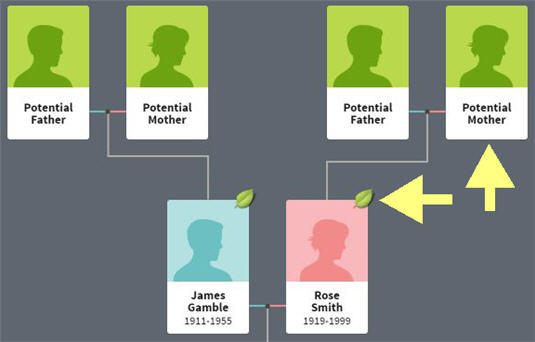
I have many DNA relatives on Ancestry.com who have trees with over ten thousand people. Personally, I have under a thousand, but I keep working on it!
Filter DNA relatives by ancestor location and surname
Winner: Ancestry
Where do you start when researching have hundreds or thousands of third and fourth cousins on either site?
A good strategy is to filter your DNA relatives whose family tree includes a specific surname or a place where your own ancestors lived.
Now that you know that Ancestry.com has family trees, you can guess that the Ancestry search and filter features go trawling through those trees.
What about 23andMe?
Well, they don’t have traditional trees but they do allow customers to add a list of surnames and locations to their account profile.
When you ask 23andMe to filter your DNA relatives by “Murphy” or “San Francisco”, this is what the software is working with.
It’s better than nothing. But it’s not better than searching through proper family trees, like on Ancestry.com.
So, both companies have this feature. But I’ve still put Ancestry as the winner.
Speculative “built for you” trees
Winner: Ancestry
Wouldn’t it be great if these companies would search through the data of your DNA relatives and build your tree for you? While you’re swinging on a hammock sipping iced tea?
Ancestry takes a good swing at this. Their “Thrulines” feature won’t actually add entries to your tree without your permission! But it makes plenty of suggestions.
In this picture, Ancestry is suggesting the relationship between myself and four DNA relatives. I have verified all of these to be correct.
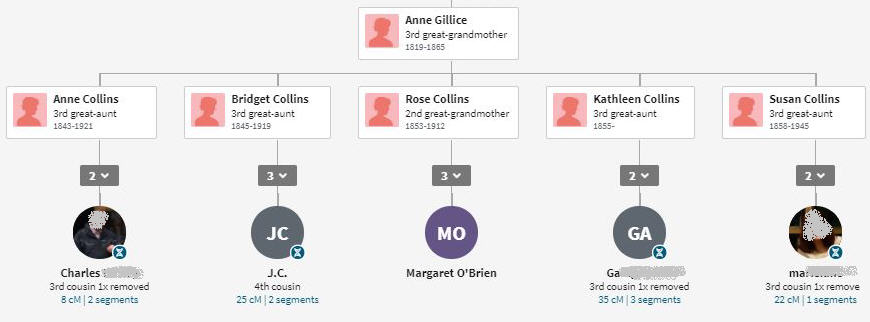
However, sometimes these suggestions are plain wrong. After all, they can only be as good as the quality of the trees they’re based on. You’ve got to check everything!
What about 23andMe? I mentioned in the section on family tree software that 23andMe has something completely different that it calls a “family tree”.
23andMe tries to give you a visualization of how your DNA relatives are related to you and to each other.
The main problem is that it doesn’t work unless you have a good number of 2nd cousins and closer on the site.
It hardly works for me at all! However, people who have plenty of 1st and 2nd cousins do report some good results.
Here’s an example from a happier customer. I’ve blocked out the faces. These are all DNA relatives that 23andMe has inserted into this tree. It’s up to the customer to work out who goes into the question-mark place-holders.
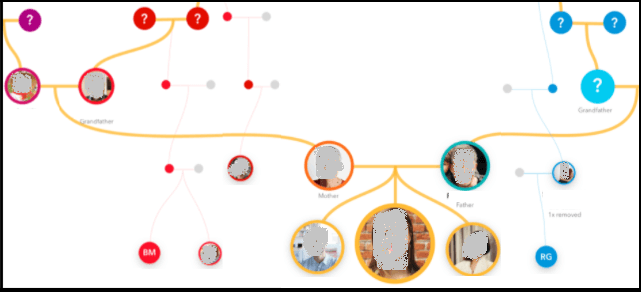
Genealogical Record Archives
Winner: Ancestry
Ancestry.com has a massive collection of genealogical records within the U.S. and across the world. These include birth, marriage, and death records along with many other types of documents.
You don’t get access to the archives just by purchasing a DNA kit.
There are a limited amount of collections that are free to use. But most are behind a paywall that requires a paid subscription.
We have a full review here of the different Ancestry subscription levels.
However, Ancestry.com isn’t the only show in town for record archives.
FamilySearch.org is a free archive with overlapping collections with Ancestry.com. There are records on FamilySearch.org that aren’t on Ancestry, and vice versa.
That’s why I have both a paid Ancestry.com membership and I dip into FamilySearch.org on occasion. I also use some other paid and free online archives!
So, you could go with 23andMe and stick with the free resources on FamilySearch and other free sites.
Where you lose out is on how Ancestry.com integrates your DNA, your relatives’ family trees, and their record archives.
Their software will save you a lot of time chasing the appropriate records.
Which Is Best For Finding Unknown Birth Family?
Winner: Ancestry
I’ve written a separate review that looks at all the major DNA tests to assess which is best for adopted adults and others looking for birth family.
The review covers 23andMe, Ancestry, MyHeritage, and FamilyTreeDNA.
It also contains a detailed strategy for combining some or all of these sites in a cost-effective way.
I’ll summarize here by saying that Ancestry.com is my recommendation as the starting point for people with unknown parentage or looking for birth family.
Then you can transfer your DNA for free to several other reputable sites to fish in more ponds for DNA relatives.
If you have the disposable income, then purchasing a second DNA kit from 23andMe may be worth your while once you’ve exhausted these resources.
Frequently Asked Questions
Who is behind these companies?
Ancestry is owned by a large investment company. You can read more in our article on who owns Ancestry.
23andMe is owned by several large investors. Read more in our article on who owns 23andMe.
Is my privacy protected?
Both sites let you choose your own display name. Some customers use their initials or a nickname.
Your DNA relatives can only contact you through the company messaging system. You choose if you wish to collaborate. You can opt-out of sharing your DNA profile with relatives, but you won’t see theirs either.
If you want to learn more, check out these in-depth articles:
- Does Ancestry sell or share your DNA?
- Does 23andMe sell or share your DNA?
- Can you test with Ancestry anonymously
- Can you do 23andMe anonymously?
Are there alternative DNA testing companies?
MyHeritage, FamilyTreeDNA, and Living DNA all offer DNA kits.
Check out our head-to-head comparisons: